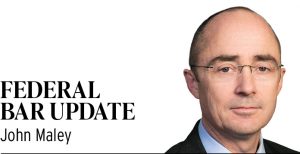Subscriber Benefit
As a subscriber you can listen to articles at work, in the car, or while you work out. Subscribe Now Effective July 1, the Southern District of Indiana made minor amendments to Local Rules 5-11 (sealed filings); Local Rule 6-1 (extensions of time); Local Rule 37-1 (discovery disputes); Local Rule 81-1 (removal); and Local Rule 83-5 (admission). The current version of the Southern District’s Local Rules are on the court’s website, which is the best source for the rules.
Effective July 1, the Southern District of Indiana made minor amendments to Local Rules 5-11 (sealed filings); Local Rule 6-1 (extensions of time); Local Rule 37-1 (discovery disputes); Local Rule 81-1 (removal); and Local Rule 83-5 (admission). The current version of the Southern District’s Local Rules are on the court’s website, which is the best source for the rules.
Southern District local rules
Highlights of notable amendments are as follows:
Local Rule 5-11 regarding sealed filings is amended to add subsection (d)(2): “The title of the document must clearly indicate that it is filed under seal. If the title cannot be publicly disclosed, an appropriate way to identify the document on the public docket must be identified directly below the title.”
Also, subsection (d)(3) now provides, “If a statute, rule, or court order authorizes the document to be sealed, the first paragraph of the document must identify with specificity the statute, rule, or
court order.”
Practical tip: For any sealed filing, review and strict adherence to Local Rule 5-11 is required. It is a complex, detailed rule, but if reviewed and followed for each sealed filing, it is logical, manageable and assists the court in adjudicating the motion.
Local Rule 6-1 regarding extensions of time is amended to clarify that the court requires all initial extensions of time for responses to pleadings and responses to written discovery to be made by notice without a proposed order, rather than by motion, unless a party objects to the extension.
Local Rule 37-1 regarding discovery disputes is amended to remove the prior exemption for good faith pre-motion confer efforts in matters with a pro se party. This change is for consistency with Federal Rule of Civil Procedure 37.
Recent authority from the Southern District recognizes the discrepancy and requires parties to comply with the federal rule. See Geng v. Spencer, 2020 WL 4557752, at *4 (S.D. Ind. Aug. 6, 2020) (“Defendant is correct that Plaintiff did not comply with Federal Rule of Civil Procedure 37. Even though Local Rule 37-1 exempts pro se litigants from the conferral requirement, the Federal Rules of Civil Procedure do not. When the two conflict, the Federal Rules of Civil Procedure control); Alerding Castor Hewitt LLP v. Fletcher, 2019 WL 1746284, at *2 (S.D. Ind. Apr. 18, 2019) (“Federal Rule of Civil Procedure 37 … does not have an exemption for pro se litigants and the federal rules control when there is inconsistency between the Federal Rules of Civil Procedure and the Local Rules.”).
Practical tip: Practitioners adverse to a pro se party must attempt to confer in good faith. As Rule 37 requires, “The motion must include a certification that the movant has in good faith conferred or attempted to confer with the person or party failing to make disclosure or discovery in an effort to obtain it without court action.” (emphasis added). For nonresponsive or uncooperative pro se litigants, reciting the good faith efforts should be sufficient.
Local Rule 81-1 regarding removal is amended to add subsection (c), which reads: “Fed. R. Civ. P. 7.1 Not Satisfied. Filing the notice of removal or the response does not satisfy the requirements of Fed. R. Civ. P. 7.1(a)(2). Any disclosure statement required by Rule 7.1(a)(2) must be filed as a separate document.”
The explanatory notes add, “Note: Amended July 1, 2023 to clarify that disclosures required under Fed. R. Civ. P. 7.1 must be filed separately and in addition to the statement required by Local Rule 81-1.”
Northern District Standing Order on Corporate Disclosures: Effective Feb. 1, the Northern District of Indiana has a new general order supplementing the disclosure obligations of Fed. R. Civ. P. 7.1. The full text of the Order is on the court’s website, but a key additional disclosure requirement (that assists the court in assessing recusal requirements) is to disclose — in addition to parent corporations and any publicly held corporation with an ownership interest in the party — any insurer that may be liable for a judgment.
Additionally, the order requires the disclosure statement to state the basis for federal jurisdiction with the facts the party asserts to establish federal jurisdiction.
Federal rules amendments on horizon: Effective Dec. 1, various amendments will take effect to several rules in the Federal Rules of Civil Procedure and Federal Rules of Appellate Procedure. Practitioners should calendar that date to review the amendments.Among the amendments, rules defining legal holidays will change to include Juneteenth National Independence Day.
Annual Federal Civil Practice Seminar: The annual three-hour federal civil practice program will be held from 1:30-4:45 p.m. Dec. 15 live in Indianapolis. Save the date.•
__________
John Maley — [email protected] — is a partner with Barnes & Thornburg LLP, practicing federal and state litigation, employment matters and appeals. He serves as chair of the Local Rules Advisory Committee, S.D. Indiana, and is a member of the Local Rules Advisory Committee, N.D. of Indiana. Opinions expressed are those of the author.
Please enable JavaScript to view this content.
